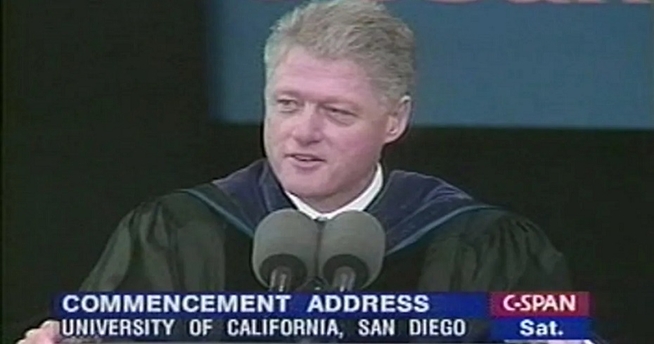 In a commencement address in California, President Clinton claimed to have special "credibility" on the subject of racial healing. |
"I want to lead the American people in a great and unprecedented conversation about race."
— President Clinton in San Diego, June 14
YOU'RE A LITTLE late, Mr. President. The American people are already having that conversation. It's been underway for quite a long time now, and it is far from clear that we need you to "lead" it.
What can you contribute to this conversation? Your position on questions of race — especially on quotas and preferences — has been clear since the first days of your administration: You support them. By your actions if not your words, you have placed yourself defiantly in the camp of those who believe that Americans must be viewed first and foremost through a prism of race.
Even before taking your oath of office, you were parceling out Cabinet seats on the basis of color and gender. You nominated law professor Lani Guinier — nicknamed "the quota queen" for her extreme racial views — to run the Justice Department's civil rights office. You supported rigid hiring quotas in the Memphis and Birmingham fire departments. You reversed the federal policy that frowned on race-based scholarships. You favored racially gerrymandered congressional districts. Through your lawyers, you intervened in defense of quotas and against colorblindness in every major affirmative-action court case of your presidency. You were even nominated for reelection at a convention that seated delegates according to a precise calculus of race, ethnicity, and gender.
Above all, you opposed Proposition 209.
Mr. President, what was California's momentous debate over 209 — an initiative barring state agencies from discriminating for or against anyone on the basis of color or sex — if not the "great and unprecedented conversation about race" you claim you are going to lead? Californians comprise one-eighth of the American nation. Racially, ethnically, linguistically, they are one of the most diverse populations on earth. You talk of launching a debate in which "emotions may be rubbed raw"; California has just been through one. For more than two years, Californians argued passionately about the wisdom and the effectiveness of racial preferences. Proposition 209 was denounced by its opponents in the most bitter and doom-laden terms. But when the debate was over and voters were asked to choose, a solid majority of them — including tens of thousands of blacks, Hispanics, and Asians — chose colorblindness.
And what was your response, Mr. President? Did you urge respect for the voters' judgment? Did you embrace their resolution that the state must stop treating citizens differently because of skin color or ethnicity? Did you honor the robustly democratic process by which the people assayed a difficult question and decided on their answer?
You did not. You joined forces with those who schemed to find a judge willing to overturn the election results. Your chief civil rights officer, bending logic to the breaking point, argued that for California to treat every individual without regard to race or gender would be a violation of the Constitution's Equal Protection Clause. The Court of Appeals for the Ninth Circuit gave that incoherent argument the short shrift it deserved — but the point, Mr. President, is that you gave short shrift to the people's decision.
And now you say that "if there is any issue I ought to have credibility on, it is this one." Are you serious? What would you think of a political activist who campaigned against your reelection, then tried to nullify your victory in court, then — proclaiming his "credibility" on the issue — declared that he wished to launch a national conversation on the topic of Bill Clinton's presidency?
You fancy yourself a racial healer. That is just what you are not. You said in San Diego: "The basic rule must be that the law must respect all our citizens." But when the law makes it easier for certain applicants to get into law school because of their color, or decrees that a fixed number of job openings will be filled with an eye to race instead of merit, or awards a public contract not to the lowest bidder but to the lowest minority bidder — when the law is not colorblind but color-obsessed, it does not respect us. It divides and demeans us. And so do you, Mr. President, when you fight to keep such laws from being changed.
Racial healing will never come from dwelling on skin color, only from gazing beyond it. And Americans do, more than ever before. What better or more beautiful proof is there than the soaring numbers of interracial children? Thirty-five years ago, fewer than 150,000 American marriages crossed racial lines. Today, 10 times as many do, and the number rises each year.
The "great and unprecedented conversation about race" you'd like to start is just about over, Mr. President. We're reaching a consensus — that race shouldn't matter. Shouldn't matter to individuals. Shouldn't matter to the state. Most of us have concluded that affirmative-action quotas and set-asides are unfair and counterproductive. Yet you and your administration pursue them more single-mindedly than ever, as though they are making life better, not worse.
Thanks for offering to lead our national dialogue, Mr. President, but no thanks. With all due respect, you've talked plenty. Maybe it's time you listened.
(Jeff Jacoby is a columnist for The Boston Globe).
-- ## --
Follow Jeff Jacoby on Twitter.
Discuss Jeff Jacoby's columns on Facebook.
Want to read more Jeff Jacoby? Sign up for "Arguable," his free weekly email newsletter.

